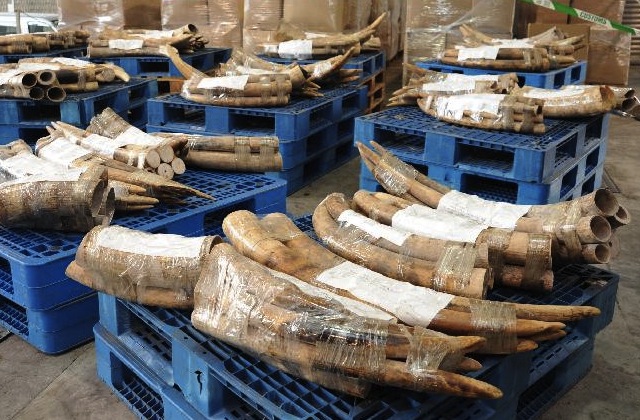Government vexed by stockpile of ivory in storage


HONG KONG -- The Hong Kong Customs and Excise Department has in recent years seized large hauls of ivory tusks, reflecting not only the alarming numbers of elephants slaughtered but also the great demand in Asia that still fuels the international trade after it was outlawed in 1989.
Within the past six months alone, three large shipments were uncovered, the largest one consisting of 1,209 tusks. But while doing its part in trying to stem the inflow of these illegal products, the Hong Kong government is facing a different sort of problem: what to do with all that ivory.
The tusks in government custody, which are building up in storage at a secret location, amount to at least the 16 tons confiscated since 2008 -- a massive stack belonging to about 1,800 elephants and worth around US$90 million, based on recent valuations.
The question of what should happen to all this ivory has proved vexing. The options seem to be to dump it in landfills, incinerate it, give it to schools for educational purposes or do nothing — none of which seems satisfying.
“There must be better options,” said Andy Cornish, former director of the World Wide Fund for Nature in Hong Kong who is now an independent ecologist. While he does not know what should be done either, he says, “I just don’t think the best option’s on the table yet.”
The government has said that burning it at high temperatures is feasible and offers the permanence of destruction, but also that it is not pursuing this disposal method for now, fearing it would be an unpopular move, according to the local English paper, the South China Morning Post.
The paper also reported that dumping into landfills and the sea had been considered but deemed unfeasible.
Last year, Gabon set five tons of tusks aflame in a very public event, as a largely symbolic gesture to show its rejection of poaching. Kenya has also held public burnings in the past. But Hong Kong does not appear to be interested in making a statement -- just to get rid of the stuff in a way that seems less wasteful.
Another option is to use the ivory to build awareness among the public, giving pieces of it to schools, for example, for students to learn about the issues. But, according to the SCMP, when the government approached schools about taking pieces of ivory, they balked at the required contracts related to security risks of possessing the pieces.
Also, schools can only use so much ivory for teaching and will barely put a dent in the 16 tons. “That’s a massive amount; you could never use that much for education,” Cornish said.
Security is a very real concern, as customs departments around the world have run into problems of theft. In Zambia and Tanzania, for example, some government seizures were stolen last year. In addition to a number of African countries, the governments of Malaysia, Vietnam and Thailand also have large amounts of ivory in their custody.
Although international trade has been banned by the Convention on International Trade in Endangered Species, selling items produced before 1989 is still legal.
These older items are purportedly what are still being hawked in some of Hong Kong’s art and antiques stores. Often, elaborately carved ivory items are displayed in the windows of these shops next to signs that admonish, “No photographs.”
But the illicit trade in ivory is thriving, with China its biggest market, conservationists say.
As one of the world’s biggest ports, Hong Kong is seen as a gateway to the rest of Asia for much of the ivory coming from Africa. And Guangzhou, just north of the city, is where a large portion of ivory is carved for the market in China, where ivory has been highly treasured for centuries.
While the large seizures in Hong Kong over the past few years signal a successfully run customs department, the effect on the global trade is likely to be small, Cornish says.
“People who trade in these kinds of things are very flexible in the methods they use,” he said, “so I’d imagine the main impact is that they’d try to avoid Hong Kong and use other methods to avoid detection.”
Photo: Hong Kong Customs and Excise Department
This post was originally published on Smartplanet.com